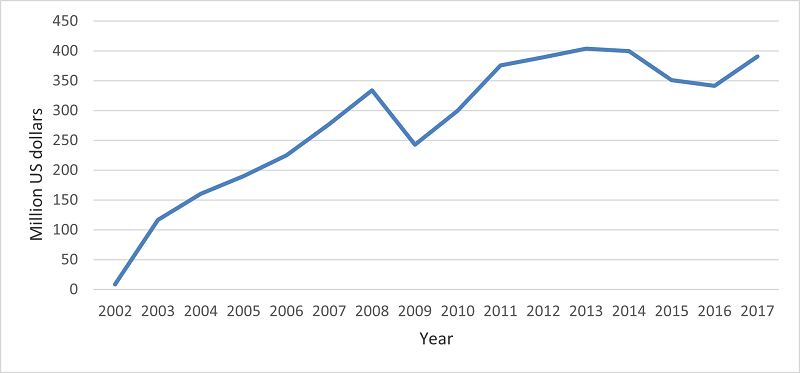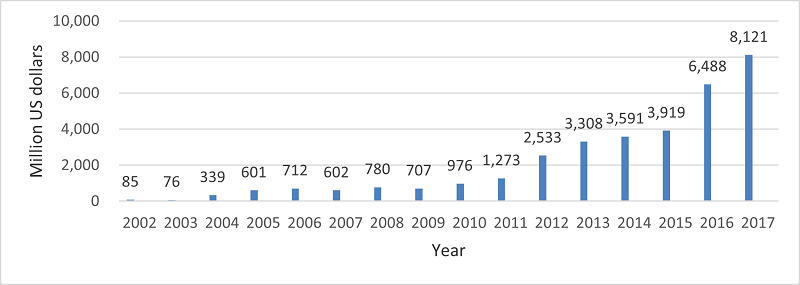IDE Research Columns
Column
Roles of Business Associations in Economic Diplomacy in Turkey
Kohei IMAI
Institute of Developing Economies, JETRO
May 2023
Economic growth that exploits the benefits of globalization is the strength of the Turkish governing party, the Justice and Development Party (AKP). The AKP has deepened economic ties in globalization as an important tool of its foreign policy, which follows a free market economy and harmonization with the EU criteria. This study focuses on business associations, which have played important roles in the economic aspects of Turkish foreign policy, under the AKP administration.
The Concept of Economic Diplomacy
Economic diplomacy consists of decision-making and negotiation on core issues, which are influenced by international economic relations. It is constructed by various actors in state and nonstate sectors. International and regional organizations also influence diplomacy, because state and nonstate actors need to consider the policies of these organizations. Among them, and especially in nonstate sectors, several scholars emphasize the contribution of private-sector bodies to economic diplomacy. For example, private sectors, including civil society, may cooperate with the state in the exchange of professional expertise, experience, and information; policy planning and advice; promotion of social responsibility; and supply of human capital.
In addition, the idea of a trading state lies at the core of economic diplomacy. In general, a trading state aims to improve its status in international politics by expanding trade and using its achievements as a leverage in domestic and international politics. In other words, the trading state utilizes interdependence in a globalized economy to achieve its domestic and international political objectives. However, this strategy is seemingly paradoxical from the classic perspective of realism in international relations. Nevertheless, Turkey, especially the administration of the Justice and Development Party (AKP), has been adept at this approach.
Turkey as a Trading State
Turkey has been aligning its policies with the globalized and neoliberal economic order since the 1980s, which makes examining Turkey as a trading state worthwhile. At the beginning, its policies as a trading state failed to bring economic wealth. Hence, the approach did not seem successful. During the 1980s and 1990s, economic disparities and inequality in society increased due to policies, which brought a negative impact on a neoliberal economy. The AKP, which was established in 2001 and has been in power since 2002, then sought to amend the imbalance in the distribution of wealth and adopted a social security policy for low-income people. In the decade, the AKP administration achieved an annual average economic growth rate (in GDP) of 10% due to its economic policy. The success of AKP in the domestic economy influenced its foreign policy; in other words, the increased economic power provided Turkey with the resources and power to return to its original policies in the 1980s. Once again, Turkey reinforced its characteristics as a trading state. In the 2000s, the AKP administration utilized its growing trade relations to strengthen bilateral relations in economic diplomacy, which frequently took the form of free trade agreements (FTAs) with other countries.

Figure 1. Turkish Trade Volume from 2002 to 2017
Source: YıLlara Göre Dış Ticaret 1923–2017, Turkish Statistical Institute Website.
However, the Turkish economy encountered obstacles again. First, its growth was hampered in the aftermath of the global financial crisis in 2008 (Figure 1). A few studies mentioned that the economic diplomacy and trading state behavior of Turkey has been in a state of dysfunction since 2008. Moreover, the civil war in Syria and the stagnated democratization in the Middle East following the Arab Spring rendered continuing foreign policy that relies on trade relations with these countries difficult for the AKP. As a result, the AKP seemingly gradually shifted from a soft power approach based on economic diplomacy to a hard power or security-centered approach.
Even under the abovementioned conditions, trade and economic relations remained as important elements of Turkish foreign diplomacy. According to data from the Turkish Statistical Institute, the volume of Turkish trade continued to increase in the 2010s at a higher rate than it did during the 2000s (Figure 1). The number of FTAs signed during the 2010s and 2020s was eleven (11), which is nearly the same as that in the 2000s (10).
In addition, notably, a survey in November 20181 demonstrated that the Turkish people in general considered economy as an important issue in foreign policy. For example, the following question was posed: “Which should be the most important issue concerning our country’s foreign policy in general?” The responses were security (33.7%), economy, (59.8%), and foreign aid (2.8%). The responses to the question: “In which one of these periods were economic issues most prominent in our country’s foreign policy?” were the 1980s (7.1%), 1990s (18.2%), 2000s (24.1%), and 2010s (28.7%). These findings demonstrated that Turkish citizens recognize that the AKP administration has emphasized economy as an element of its foreign policy than did other administrations in the 1980s and 1990s.
Business Associations and Three Layers of Economic Diplomacy
The economic policy in Turkey is composed of three layers. The first is economic relations with developed countries, such as the EU, the United States, and Japan. The second pertains to relations with developing countries. Finally, the third denotes relations with least developed countries (LDCs). At this bottom layer, Turkey began playing a role as a donor country to assist in the development of LDCs. Thus, its behavior as a trading state is an important point to examine as well as the roles performed by business associations, which are nonstate actors in the private sector and will be described in detail in the subsequent text.
To conduct economic diplomacy in each of the three layers, the Turkish government has collaborated with different groups in the state and private sectors. Among them, the Union of Chamber and Commodity Exchanges of Turkey (TOBB) and the Turkish Industrialists and Businessmen’s Association (TÜSİAD) have been essential actors in relationships with developed countries (i.e., at the first layer). At the second layer, the Foreign Economic Relations Board (DEİK) is the main actor in establishing networks with developing countries. At the last layer, the Turkish International Cooperation Agency (TİKA) is the central actor. DEİK and TİKA are state organizations.
These organizations are not political instruments designed to work with the Turkish government on a daily basis. This study conducted interviews with the staff of TÜSİAD and DEİK about their relations with the government. The interviewees reported that both organizations decide and act independently from the government in principle. Only when the government requests support or collaboration will they offer information and cooperation in activities related to their projects. For example, TÜSİAD assisted the EU accession of the AKP in the 2000s through lobbying activities. Evidently, business associations are rewarded. They enjoy the privilege of participating in the policy-making process for economic diplomacy.
According to its website, TÜSİAD, which was founded in 1971, is a voluntary, independent, nongovernmental organization that promotes development through private enterprises. The main areas of its activities are economic policy, industrial policy, and investment in foreign countries. Its activities outside the country covers the EU and EU Customs Union, the United States, China, G20, and their transatlantic and regional partners. It has helped the Turkish government through the information and network that they have established with these governments. In summary, TÜSİAD focuses on developed countries and major powers, which belongs to the first layer of economic diplomacy in Turkey.
At the second layer, the DEİK was established in 1986 under the TOBB. Compared with TÜSİAD, the network of DEİK is seemingly more diverse. According to its brochure, DEİK has focused on economic relations with developed countries during its founding period. After the end of the Cold War, DEİK began to expand its relations with developing countries, especially those in Central Asia and the Middle East. Although DEİK continues to maintain multiple networks today, its main activities are focused on developing countries.
TİKA, which is at the third layer, was established in 1992 mainly to aid newly independent countries in Central Asia, Southern Caucasus, and the Balkans. Under the AKP administration, TİKA has been especially active since 2002 to assist these countries in developing infrastructure (Figure 2). Since the 2000s, the targets of their activities have expanded worldwide given that its counterparts are developing or less developed economies. TİKA currently has 57 offices in 54 countries and operates in 150 countries. A total of 37 and 17 countries are developing countries and LDCs, respectively.

Figure 2. Turkey’s Annual Official Development Assistance
Source: Turkish Development Assistance Report 2017. https://www.tika.gov.tr/upload/sayfa/publication/2019/TurkiyeKalkinma2019WebENG.pdf
Final Remarks
The AKP administration has utilized economic relations as a foreign policy tool following the model of economic diplomacy as a trading state since the 1980s. Alternatively, business associations feature their experiences and networks with counterparts in foreign countries, and the AKP has used these knowledge and networks to increase diplomatic relations with developed and developing countries. For instance, TÜSİAD had conducted lobbying activities toward the EU in the 2000s. In addition, it has expanded the scope of economic diplomacy by being a donor to LDCs through collaboration, especially with TİKA. Turkey has maintained its economic-centered foreign policy approach even after increased security threat during the 2010s.
Notes
- This survey was conducted with 525 Turkish citizens living in 17 provinces in November 2018.
Authors’ Note
This column is based on partial quotations from Kohei, Imai. 2022. “Economic Diplomacy on Turkish Foreign Policy under AKP.” IDE Discussion Paper no. 856. http://doi.org/10.20561/00053081
Author’s Profile
Kohei IMAI is an Overseas Research Fellow of Institute of Developing Economies. He received BA and MA degrees from Chuo University and concluded his PhD in the Department of International Relations, Middle East Technical University, Turkey in 2011, and the Graduate School of Law (Major of Political Science) at Chuo University in 2013 (dual PhD). He is the author of various books and articles on Turkish foreign policy and the Theory of International Relations in the English and Japanese languages.
* Historic red tram on crowded Istiklal Avenue in Taksim, Istanbul (damircudic / E+ / Getty Images)
** The views expressed in the columns are those of the author and do not represent the views of IDE or the institutions with which the author is affiliated.


